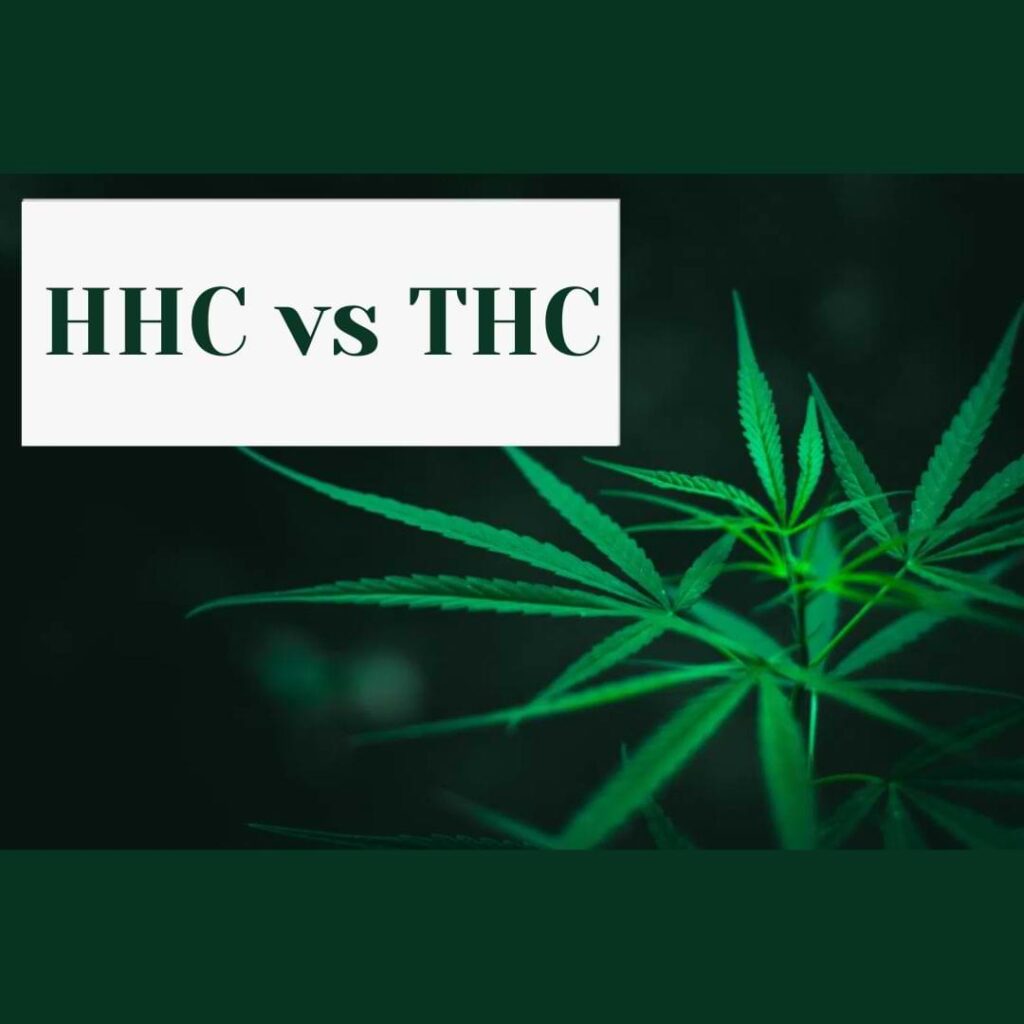
HHC, or hexahydrocannabinol, and THC, or tetrahydrocannabinol, are two compounds that are found in the cannabis plant. Both of these compounds belong to a family of chemicals known as cannabinoids, which are known for their ability to interact with the body’s endocannabinoid system.
Despite being similar in structure, HHC and THC have some notable differences when it comes to their effects on the body. THC is the primary psychoactive compound in cannabis, meaning that it is responsible for the “high” that is commonly associated with cannabis use. When THC is consumed, it binds to receptors in the brain and nervous system, producing a range of effects, such as altered mood, increased appetite, and decreased pain perception.
When it comes to comparing HHC vs THC, it is worth noting that HHC, on the other hand, is believed to be less psychoactive than THC. While it is thought to interact with the endocannabinoid system in a similar way, it is not known to produce the same intense euphoria or altered state of mind that THC does. Some users have reported feeling more focused and energized after using HHC, rather than feeling “stoned” or “high.”
Another key difference between HHC and THC is their legal status. THC is a controlled substance in many parts of the world, meaning that it is illegal to possess or use it without a valid prescription. However, in some places, such as certain states in the United States, THC has been legalized for medical or recreational use. HHC, on the other hand, is not explicitly regulated in most places. This means that it is technically legal in most countries, although there may be some restrictions on its use or sale depending on where you are located.
When it comes to how these compounds are produced, it is worth noting that HHC is a relatively new addition to the cannabis scene. While THC has been studied extensively for decades, HHC has only recently begun to receive attention from researchers and cannabis enthusiasts alike. Some companies are producing HHC from natural cannabis plants, while others are creating it synthetically in a lab. This means that there is still much to be learned about the safety and efficacy of HHC, as well as the potential risks associated with its use.
As research into these compounds continues to evolve, we’ll go over the key distinctions, practical applications, and other relevant specifics.
Uses
While both HHC and THC are cannabinoids found in the cannabis plant, their uses can differ significantly. THC is commonly used for recreational and medical purposes, particularly for its psychoactive effects.
HHC |
THC |
| Antibacterial properties: Some studies have suggested that HHC may have antibacterial properties and could be used to treat infections caused by certain types of bacteria. | Pain relief: THC is commonly used to treat chronic pain, including pain caused by conditions such as arthritis, multiple sclerosis, and cancer. |
| Anti-inflammatory properties: Early research suggests that HHC may have anti-inflammatory properties, which could make it a potential treatment for conditions such as arthritis or inflammatory bowel disease. | Nausea and vomiting: THC can help reduce nausea and vomiting, particularly in people undergoing chemotherapy or radiation treatment. |
| Appetite stimulation: While not as potent as THC in this regard, some users have reported that HHC can help stimulate appetite and reduce nausea. | Muscle spasms: THC can help reduce muscle spasms, including those caused by conditions such as multiple sclerosis. |
| Psychoactivity: While HHC is typically less psychoactive than THC, it can still produce some degree of altered mental state or euphoria in some users. | Anxiety and depression: While high doses of THC can worsen anxiety and depression, low to moderate doses may help alleviate symptoms in some individuals. |
It’s worth noting that the uses of both HHC and THC are still being studied and their potential benefits and risks are not yet fully understood. As with any substance, it’s important to approach their use with caution and consult with a healthcare professional if you have any concerns.
Risks and Consequences
Both THC and HHC carry certain risks and consequences associated with their use. These can include short-term effects such as impaired cognitive function and increased heart rate, as well as long-term effects such as addiction and respiratory problems. To understand more in-depth the specific risks and consequences associated with THC and HHC use, see the table below.
HHC |
THC |
| Lack of research: While early studies suggest that HHC may have potential benefits, there is still very limited research available on the substance. This means that the long-term effects of HHC on the body are not yet fully understood. | Impaired cognitive function: THC can impair cognitive function, particularly in areas such as memory and attention. This can be particularly concerning for adolescents, whose brains are still developing. |
| Lack of research: While early studies suggest that HHC may have potential benefits, there is still very limited research available on the substance. | Risk of addiction: While the risk of addiction to THC is relatively low, some individuals may develop a dependence on the substance over time. |
| Potential for contaminants: Because HHC is a newer compound, there is a risk that some products may be contaminated with other substances or impurities. This could be particularly concerning for individuals who use HHC for medical purposes. | Potential for negative side effects: THC can cause negative side effects such as anxiety, paranoia, and increased heart rate in some users. These effects can be exacerbated in individuals who are sensitive to the substance or who consume high doses. Some users may experience chest or lung discomfort, Sweating is a common side effect of THC use, and THC can cause hallucinations, especially at higher doses. |
| Unknown safety profile: Because HHC is a relatively new compound, its safety profile is not yet fully understood. This means that individuals who use HHC may be taking a risk with their health. | |
| Other negative side effects: HHC can cause a decrease in saliva production, leading to dry mouths, Like THC, HHC can cause bloodshot eyes and redness, HHC can stimulate the appetite, often leading to increased hunger, Some users may experience feelings of paranoia after using HHC, HHC can interfere with sleep patterns and cause insomnia. |
How to Choose the Ideal Option
Whether you want to take HHC or THC is a matter of personal preference that should be considered in light of your specific circumstances. Having said that, there are a few other aspects that should be taken into account:
Medical conditions: Different medical conditions may respond better to THC or HHC. For example, THC may be more effective for treating pain and muscle spasms, while HHC may be more effective for reducing inflammation or treating bacterial infections. Consulting with a healthcare professional can help you determine which substance may be best suited to treat your specific medical condition.
Personal health history: Individuals with a history of substance abuse or addiction may be more at risk of developing a dependence on THC, while people with preexisting mental health issues may be more vulnerable to THC’s potential side effects. Similarly, individuals with certain allergies or sensitivities may not be able to tolerate HHC. It’s important to consider your personal health history and any potential risks associated with either substance.
Legal status: The legal status of THC and HHC can vary depending on your location. THC is currently legal for medical or recreational use in some states and countries, while HHC is not yet widely available. It’s important to understand the legal status of each substance in your area before making a decision.
Cost: The cost of THC and HHC products can vary widely, and may be affected by factors such as availability, purity, and demand. It’s important to consider the cost of each substance and whether it fits within your budget.
The duration of the high or psychoactive effects associated with THC and HHC can vary depending on a number of factors, including the method of consumption, the dose is taken, and an individual’s tolerance level.
How long does the high from HHC and THC last?
THC:
When THC is consumed orally, such as through edibles, the onset of the high can take up to an hour or more to be felt and can last for several hours, typically up to 4-6 hours. When inhaled through smoking or vaping, the effects can be felt within minutes, but typically last for a shorter period of time, usually around 2-3 hours. However, it’s important to note that the duration of the high can be influenced by the potency of the THC product, the method of consumption, and an individual’s metabolism and tolerance level.
HHC:
The duration of the high associated with HHC is not yet fully understood, as there is limited research available on the substance. However, some reports suggest that the effects of HHC may be shorter-lived than those of THC, with some users reporting feeling the effects for only 1-2 hours after consumption. As with THC, the duration of the high associated with HHC can be influenced by factors such as the method of consumption, the dose is taken, and an individual’s tolerance level.
It’s worth noting that the duration of the high is not necessarily indicative of the overall effects of THC or HHC on the body. These substances can have a number of other effects that may last longer than the psychoactive high, such as pain relief or improved mood. Additionally, both THC and HHC can accumulate in the body over time, meaning that regular or heavy use can result in a longer-lasting effect.
Conclusion
While both HHC and THC may have potential benefits, they also come with risks and drawbacks that should be carefully considered. As with any substance, it’s important to approach their use with caution and seek guidance from a healthcare expert if you have any concerns. Ultimately, the decision to use HHC or THC should be based on an individual’s unique needs and circumstances and should be made with the understanding that there are potential risks associated with their use.







